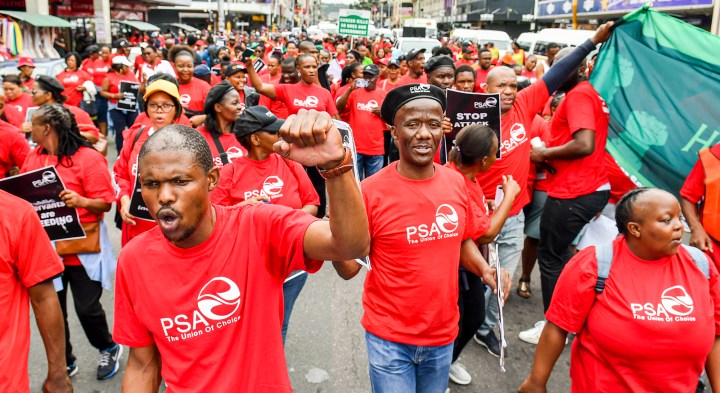LABOUR PAINS
Why the public servants’ ‘mother of all strikes’ is destined to fizzle out

Public servants don’t have an appetite to embark on a prolonged strike, such as the one that lasted for 20 days in 2010 and ended when they accepted a 7.5% pay rise. The reluctance of public servants to down tools is mainly due to household financial pressures — as they lose out on wages during a strike — and the working year winding down for the festive season.
Thousands of public servants affiliated with the Public Servants’ Association (PSA) trade union downed tools on Thursday and held marches across SA over their unhappiness about the government’s decision to unilaterally implement a below-inflation rate 3% pay rise for 2022.
It was the first industrial action in the public sector in 12 years — but was much more muted this time, with no significant threat of bringing public services to a halt or collapsing the country. And unlike the public sector strike in 2010, which lasted for 20 days and paralysed schools and hospitals, public servants belonging to other trade unions don’t seem to have an appetite for industrial action.
South Africa has about 1.3 million public servants, of which about 235,000 belong to the PSA (so the trade union claims). Most of the PSA’s members are state administrators working for the departments of home affairs and transport, as well as officials at borders across the country.
Even if all of the PSA’s members were to go on a strike, they would constitute only 18% of SA’s public servants, hardly enough to bring down the public sector or service delivery. The strike is struggling to attract large support numbers from public servants for several reasons.
First, about 350,000 teachers (also public servants), mainly members of the South African Democratic Teachers’ Union, have already accepted the government’s 3% pay rise offer, which is below consumer inflation, measured at 7.5% in September.
Second, other public servants including doctors, nurses, police and prison officials are not able to go on strike because they are considered to be providing essential services and are prevented by the Labour Relations Act from striking. These public servants cannot participate in full-blown strikes, only in lunchtime pickets.
These two factors take a huge chunk of public servants out of the strike equation.
Visit Daily Maverick’s home page for more news, analysis and investigations
Strike delays
The PSA was the first trade union to declare a dispute with the government over its pay rise offer and demanded an increase of at least 6.5%. It was also the first trade to be issued with a strike certificate by the Public Service Coordinating Bargaining Council (PSCBC), on 22 September, which paved the way for it to give the government a seven-day notice about the strike action. The PSCBC is where the government and trade unions negotiate about conditions of employment in the public sector.
The PSA has been sitting with the strike certificate for months and repeatedly promised a “mother of all strikes”. But on Thursday it used the certificate only to ask its public servant members to withdraw their labour for a full day.
Other trade unions have also been issued with strike certificates by the PSCBC. They include the National Education, Health and Allied Workers’ Union, the Police and Prisons Civil Rights Union, the Democratic Nursing Organisation of SA, the Health and Other Services Personnel Trade Union of SA, and the SA Policing Union. The unions have not announced their next moves or whether they will join the PSA strike. But the broader consensus among the trade unions is to avoid strike action.
Most unions don’t want to go on strike
The reluctance of public servants to down tools is mainly due to financial household pressures — as they lose out on wages during the strike action — and the working year winding down for the festive season.
Also, a senior pay negotiator for one of the trade unions told Business Maverick that the negotiating power of unions had been weakened by a fairly recent ruling from the Constitutional Court. The ruling reinforced the government’s powers and discretion to enter into collective wage agreements or renege on them when it can no longer afford to do so.
Read more in Daily Maverick: “Big victory for the state as unions lose bid to force public sector wage increases”
The government has also not been shaken by the PSA’s strike on Thursday, saying its operations and service delivery have not been disrupted. A spokesperson for the Department of Public Service and Administration, responsible for employment conditions in the public sector, said government offices were operating normally, with “most, if not all, public servants at their posts”.
The government used its powers to ram through a 3% wage deal, which also included a R1,000 monthly cash bonus for public servants, until the end of March 2023. Employment and Labour Minister Thulas Nxesi did this by invoking section 5 of the Public Service Act, which empowers him to table and forge ahead with a final wage offer without consent from trade unions. Finance Minister Enoch Godongwana has already budgeted for the 3% pay rise, setting aside R690-billion to remunerate public servants.
According to Business Day, the remuneration of public servants will reflect a backdated 3% wage increase in their bank accounts on 17 November. The pay of public servants will be backdated to April.
Back to the strike by PSA members. The trade union has given the government seven days to respond to a list of its demands, including a pay rise that is either linked to or above inflation. After seven days, the union will decide on the way forward. DM/BM



















Comments - Please login in order to comment.